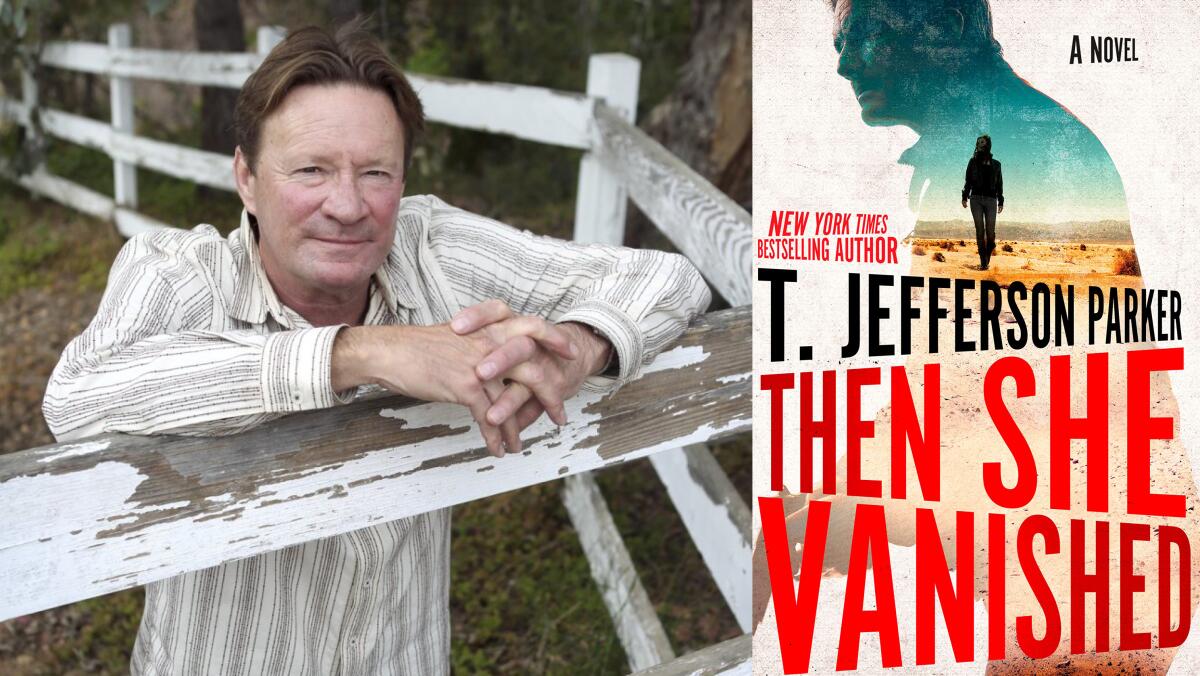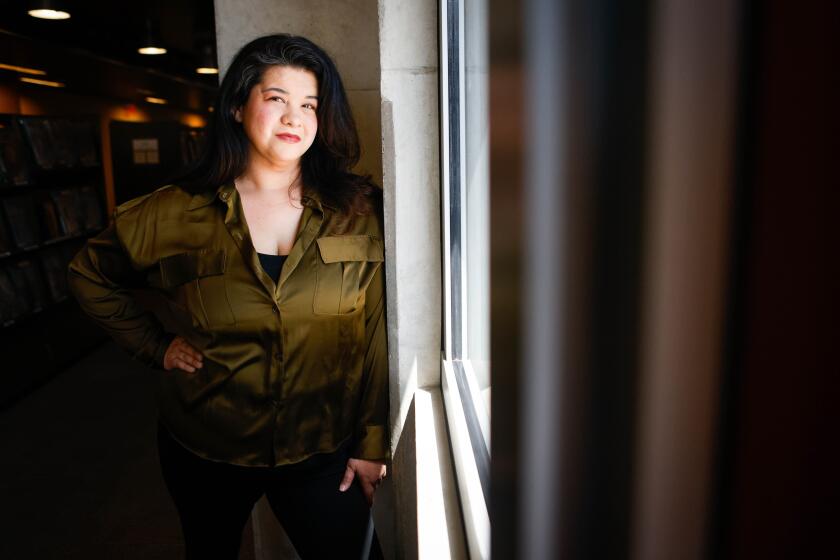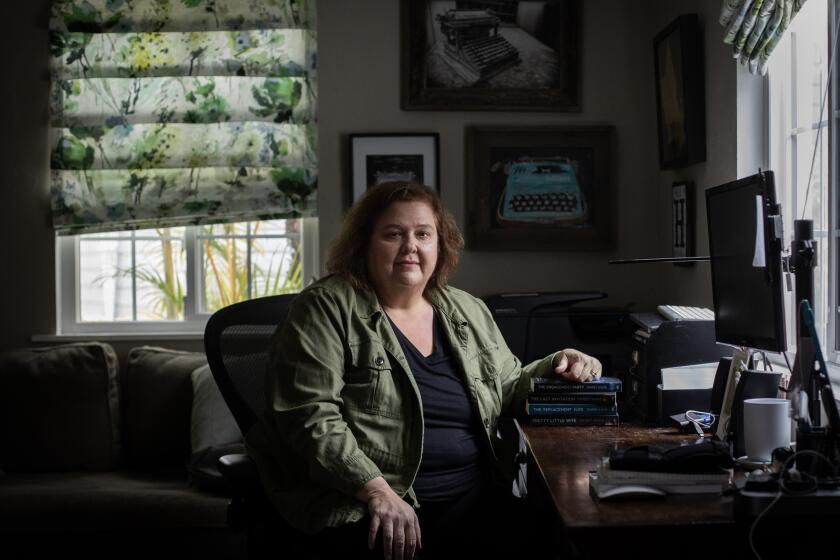T. Jefferson Parker brings the twists in latest thriller

Fallbrook writer’s ‘Then She Vanished’ is the latest in the San Diego-set Roland Ford series
Red herrings, plot twists and troubled protagonists — these are just a few of the many trademarks within the thriller and mystery genres.
One of the more understated marks of a good thriller writer, however, is their ability to pen a tale that is of the times, but remains relatable years, decades, even centuries down the road. That is, a truly good thrill comes from a place of empathy. Readers might not have firsthand knowledge of Sherlock Holmes’ Victorian England, but we still consume his adventures precisely because his types of investigations could still happen today.
T. Jefferson Parker is relatively humble and likely wouldn’t count himself among the likes of Agatha Christie, Arthur Conan Doyle or even John le Carré, but he has penned over 20 best-selling mysteries, almost all of which seem to deal in timely themes. It’s almost hard to believe that he began writing his latest novel, “Then She Vanished,” last year and not, say, last month or even last week.
“The underlying thing that was really agitating me in this book was our stiff, bitter political divisions and our seeming to lust for violence,” says Parker from his home in Fallbrook. “All that anger and all the things Roland talks about early in the book, I think is real. It’s growing and brewing. I think it’s connected to that hard political divide we’re looking at right now.”
The “Roland” that Parker is referring to is Roland Ford, the protagonist of “Then She Vanished.” The book is the fourth installment in a series of books that began with 2017’s “The Room of White Fire” and which centers on a haunted former Marine-turned-private investigator. In the latest volume, Roland is looking into the disappearance of the wife of a state assemblymember. Set in Fallbrook and San Diego, the book is also set amidst a volatile insurrection with a shadowy organization called the Chaos Committee setting off bombs and sowing unrest in the streets.
Even though Parker has lived in Fallbrook since 2000, the town, and San Diego in general, was never featured as prominently as they are in the Roland Ford series. The city would occasionally pop up in some of his preceding novels but for the Ford series, Parker says that the city and region became something of a central character in itself.
“I do think of it as a character,” Parker says. “I love writing about where I live because my material is all around me. The San Diego surf is sort of the accepted canon and cliché, and I’m not super interested in that.”
In fact, the latter point is one of Parker’s greatest strengths as a writer. That is, his ability to cast the San Diego region in a different light. For readers who don’t live here, there is often a narrow concept of what San Diego is all about (beaches, sunshine, military, etc.). In the Roland Ford series, readers are exposed to a grittier underbelly of the city, while locals will surely appreciate Parker’s ability to avoid banal landmarks. Even the otherwise quaint town of Fallbrook is painted as having a hard-boiled side.
“Fallbrook, to Roland, is Norman Rockwell meets occasional darkness,” Parker says. “And that’s us, we have a darker side, a meaner side. I feel it’s important to portray a community as having light and dark because no place is as sunny and perfect as the chamber of commerce would have you believe. And no place is as horrible and dark as some unhinged thriller writers would make it seem.”
One could say that Parker was exposed to that dark side of crime and politics early in his career. Fresh out of college, he thought he was about to settle into a career working as a reporter in Orange County. To hear him tell it, he was hungry, working multiple beats for The Newport Ensign, which included covering city hall politics and crimes.
“I was covering pretty much everything but business and sports,” Jefferson says. “It just really opened my eyes and showed me how the world operates.”
It was also around this time that Parker began reading mystery writers such as Raymond Chandler, Dashiell Hammett and John MacDonald. He began working on a more personal novel, finished it, but says he put it away in a drawer and began writing his first mystery.
His first foray at a mystery novel (1985’s “Laguna Heat”), however, did not remain in a drawer and became a best seller and was eventually made into a movie for HBO.
“After that, I basically just took what was working for me and never looked back,” Parker says.
It’s definitely been working for him. Many of his novels have gone on to become best sellers, and he’s one of the few writers to have won the Edgar Award (essentially the mystery genre’s highest honor) three times. At this point, he has had three series featuring reoccurring protagonists, but many of his most beloved books, such as 2001’s “Silent Joe” and 2004’s “California Girl,” are standalone novels. Parker says as much as enjoys writing the Roland Ford books, he concedes the character may need a break after the chaotic events of “Then She Vanished.”
“I do know what’s next for me, and it’s going to be a coming-of-age story about a 16-year-old boy looking for his missing sister in 1968 Laguna Beach,” Parker says. “A town reeling from drug, sex and rock ’n’ roll, so that’ll be fun.”
“Then She Vanished” by T. Jefferson Parker (G.P. Putnam’s Sons, 352 pages)
Combs is a freelance writer.
Get U-T Arts & Culture on Thursdays
A San Diego insider’s look at what talented artists are bringing to the stage, screen, galleries and more.
You may occasionally receive promotional content from the San Diego Union-Tribune.




